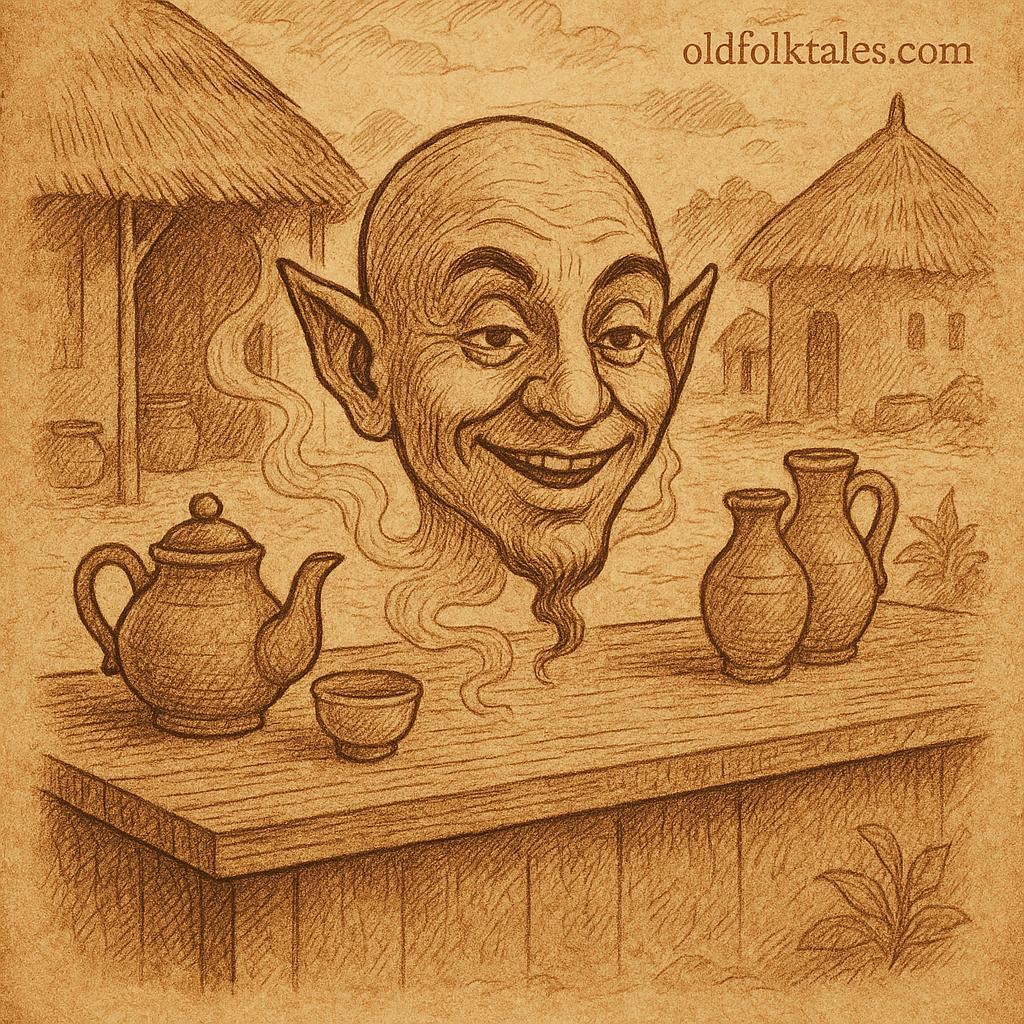Long ago, in a faraway village, there lived a man with two wives. His first wife was honest, hardworking, and kind. She did everything well, caring for the home and the family with a heart full of goodness. But the man did not appreciate her. Ungrateful and impatient, he divorced her and took another wife, hoping for children and fortune.
The second wife struggled for many years to have a child. At last, she became pregnant, and the man waited eagerly for the birth. But when the child came, it was not an ordinary child. It was only a head. The head could eat, drink, and move, yet it had no body. Confused and frightened, the man and his wife decided to get rid of it. They placed the head carefully into a sack and left it by the roadside.
READ THIS: The Cannibal Woman
But the head was alive and clever. It shouted from the sack, “Please, take me!” Passersby heard the voice and gathered around. Curiously, they lifted the sack and began to carry it toward the city.
“What shall we do with you?” they asked.
“Take me to the first tea shop you see,” the head said. “Place me there, and all will become clear.”
The people followed the instructions. At the tea shop, the head spoke to the shopkeeper. “Do you want to grow rich?” it asked.
“Yes, I do,” said the man.
“Then take care of me. Feed me and listen to my advice. But do not ask questions beyond what I tell you.”
The shopkeeper agreed, and soon, under the guidance of the head, his fortunes changed. The head instructed him to trade wisely, to raise many animals, and to gather rugs and other valuable goods. People came from far and wide, eager to buy the shopkeeper’s treasures. In no time, he became rich beyond his dreams.
Not far from the city lived a king with a beautiful daughter. When she grew old enough to marry, the king announced, “I will give my daughter to anyone who brings me what I desire.”
Every Saturday, suitors arrived with gifts, hoping to win her hand. The king scrutinized each offering and rejected nearly all. “No, this is not enough. Bring me that and that,” he demanded, listing impossible tasks.
One day, the head whispered to the tea shopkeeper, “Go to the king and ask him what he wants for his daughter.”
The man obeyed, and the king replied, “I want a he-camel. Not just any camel. It must salute me and speak my language.”
When the shopkeeper returned, he told the head.
“The king wants a talking camel?” said the head.
“Yes,” said the man.
“Then we will provide it. Go to this place and buy this camel,” the head instructed. The shopkeeper followed the instructions exactly. On the appointed day, he presented the camel to the king. The animal saluted and spoke perfectly, fulfilling every requirement. The king was astonished and promised, “Tomorrow, you may come to marry my daughter.”
The shopkeeper rushed back to the head. “Everything is ready. What shall we do now?”
“Take me!” said the head. “Let me be the candidate.”
On the day of the wedding, the king and all the people gathered, eager to see the bridegroom. The shopkeeper presented the head. “Here he is!” he said.
The king and crowd gasped in shock. But bound by his word, the king consented to the marriage. The head was brought into the palace, and the wedding was performed.
That night, as the couple entered their room, a miracle occurred. The head transformed into a strong, handsome young man. By morning, he had fully grown into a fine and noble man. The king, the queen mother, and all the city rejoiced. The young man became the heir to the throne, admired and celebrated by everyone.
Years passed, and disaster struck the family of the man who had abandoned the first wife. Poverty and famine forced him and his wife to seek help from the city. When they arrived, they were brought before the ruler—the young man they had once rejected.
The young man revealed himself gently. “I am your son,” he said. “Bring my mother food and my father here. Take these gifts, and return to your home, but tell no one that I am your son.”
The former husband and his second wife were humbled and grateful. The head had brought justice to the honest first wife and rewarded the tea shopkeeper, who had been faithful and kind. In the end, goodness and cleverness triumphed, and the man who had been wronged rose to power and happiness.
Moral Lesson
The Head teaches that honesty, hard work, and kindness are rewarded, while ingratitude and injustice lead to misfortune. Even the smallest, seemingly powerless, can rise to greatness with wisdom and courage. True justice may come in unexpected forms, and those who honor goodness will prosper.
Knowledge Check
What was unusual about the child born to the second wife?
The child was only a head, but it could eat, drink, and move.How did the head help the tea shopkeeper?
It gave advice on trade, animals, and rugs, helping the man become rich.What impossible task did the king set for suitors?
He asked for a he-camel that could salute and speak his language.How did the head transform after the wedding?
The head became a strong, handsome young man, revealing his true form.Why did the young man forgive his father and mother?
He showed kindness while giving them gifts, teaching that justice can be tempered with mercy.What is the main lesson of The Head?
Honesty, hard work, and cleverness are rewarded, while ingratitude and injustice bring consequences.
Cultural Origin: Somalia (Eastern African Folktale)






